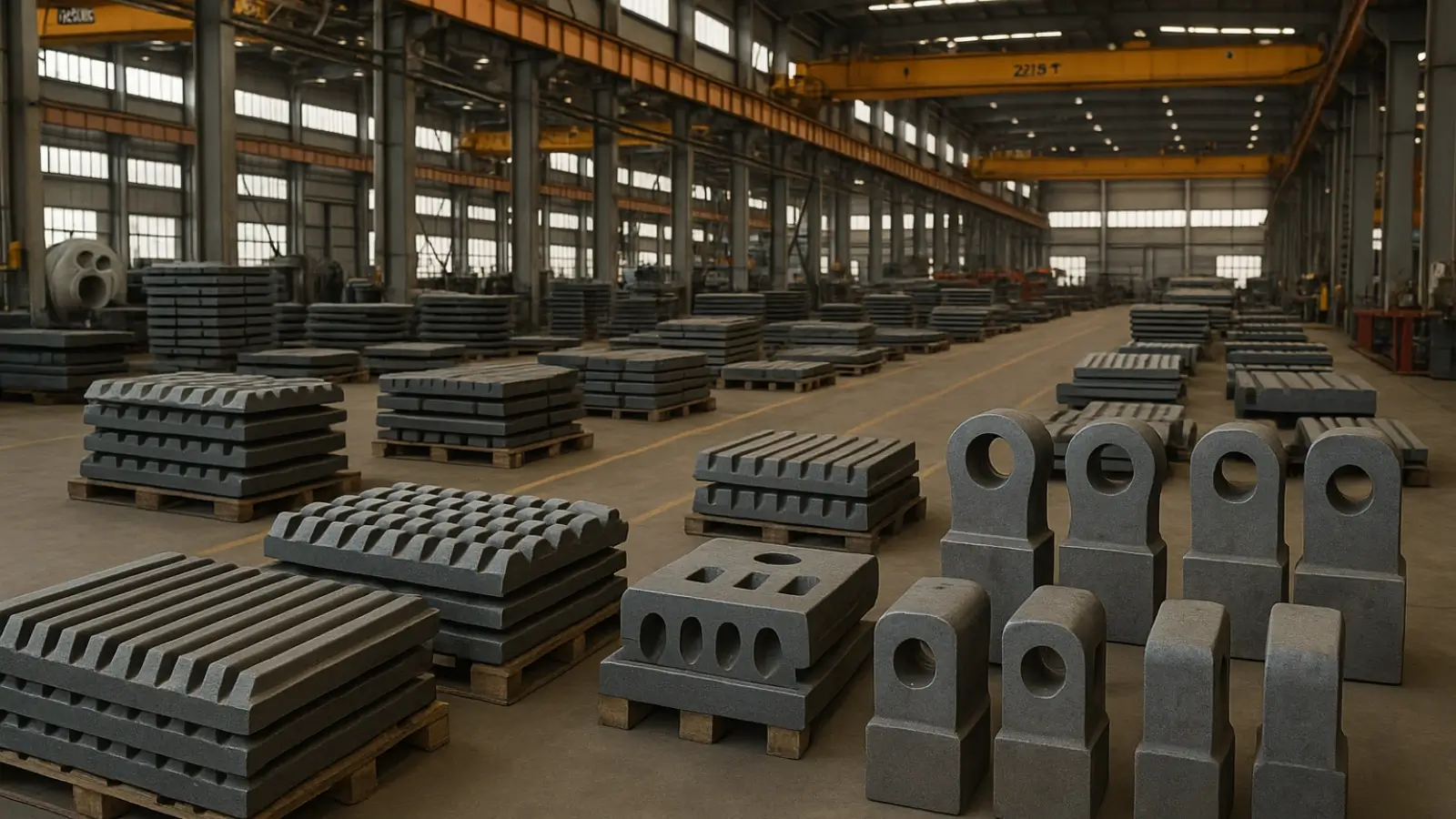


In heavy industries such as mining, cement, aggregate, and construction, crushers are the heart of material processing. However, even the most powerful crusher is only as efficient as the wear parts it uses. These components—such as hammers, jaw plates, blow bars, mantles, and liners—bear the brunt of the crushing process. Choosing the right supplier for these parts is not just a purchasing decision; it’s a strategic move that directly affects your production efficiency, downtime, and overall cost per ton.
Finding a reliable crusher wear parts supplier can make a significant difference between stable operations and recurring breakdowns. Let’s dive into how to identify, evaluate, and collaborate with the best partners in this highly competitive global market.
Wear parts are more than consumables—they are precision-engineered components designed to protect your crusher’s core structure. Poor-quality parts wear out faster, reduce crushing efficiency, and increase replacement frequency.
High-quality crusher wear parts are characterized by:
Premium raw materials: Such as high manganese steel, martensitic steel, or chromium-molybdenum alloy.
Accurate fitment: Ensuring tight tolerance between parts to reduce vibration and premature wear.
Optimized heat treatment: Achieving the perfect balance between hardness and toughness.
Surface finish quality: Smoother finishes reduce material buildup and extend service life.
A trusted manufacturer understands how to balance these factors to meet various crushing environments—from limestone and granite to slag and iron ore.
Before selecting a supplier, it’s vital to know what kind of wear parts you need and their roles in the crushing system.
|
Crusher Type |
Key Wear Parts |
Main Function |
|
Jaw Crusher |
Jaw plates, cheek plates |
Crush large rocks by compression |
|
Cone Crusher |
Mantles, concave |
Crush materials through squeezing action |
|
Impact Crusher |
Blow bars, impact plates |
Break materials using impact energy |
|
Hammer Crusher |
Crusher hammers, grate plates |
High-speed impact crushing |
|
VSI Crusher |
Tips, anvils, rotor parts |
High-speed rock-on-rock crushing |
Different materials and designs are suited for specific crushing conditions. A professional supplier will not only provide parts but also offer technical recommendations tailored to your equipment and operation conditions.
Many plant managers and procurement officers struggle when sourcing wear parts internationally. Common challenges include:
Inconsistent Quality: Some suppliers offer low-cost options that wear out in weeks, increasing overall maintenance costs.
Unclear Material Standards: Without proper certification or composition data, it’s difficult to verify if materials meet industrial standards.
Long Delivery Times: Delays in production or shipping can lead to costly downtime.
Poor After-Sales Support: Once the order is shipped, communication often stops—leaving you without technical help.
Lack of Customization: Generic parts rarely fit perfectly or perform optimally in specific plant conditions.
The key to solving these challenges lies in choosing a reliable and experienced supplier who can guarantee both quality and consistency.
Finding the right partner is a combination of technical assessment, business verification, and long-term cooperation potential. Here are practical steps to follow:
Ask the supplier for detailed material reports, heat treatment certificates, and hardness test results. Reliable suppliers are transparent about their metallurgical processes and material grades.
A good supplier should have:
Advanced foundry facilities
CNC machining centers
Heat treatment and quenching equipment
Strict quality inspection systems
If possible, request photos or videos of their production process. Manufacturers that showcase their facilities demonstrate confidence and transparency.
Long-term players in the market are less likely to cut corners. Check if they’ve supplied to well-known crusher brands or exported to recognized markets such as Europe, the Middle East, or South America.
Ask if the supplier can produce parts according to OEM numbers or engineering drawings. The best suppliers can customize parts to match specific wear profiles, improving both performance and lifespan.
A supplier’s responsiveness and technical knowledge are strong indicators of reliability. Look for clear communication, accurate quotations, and prompt updates.
When you deal directly with a crusher wear parts manufacturer, you bypass middlemen who add cost but no value. Manufacturers have better control over production, raw material quality, and delivery schedules.
Direct communication with engineers also means you can discuss design improvements or request OEM-level customization. This collaboration often results in longer-lasting parts and better operational performance.
Some reliable manufacturers even offer 3D scanning and reverse engineering for old or discontinued parts—helping you save time and reduce downtime.
Econe is a trusted crusher wear parts manufacturer in China that provides high-quality hammers, jaw plates, and liners for various crusher models. With advanced casting technology, professional heat treatment, and strict inspection standards, Econe has established itself as a reliable partner for global mining and cement plants seeking durable wear components.
Based on industry experience, here are a few characteristics that set apart a dependable supplier from the rest:
Consistent product quality with verified testing data
Transparent pricing without hidden charges
Flexible MOQ (Minimum Order Quantity) for trial orders
On-time delivery performance backed by export experience
Technical consultation available before and after purchase
Positive reviews or references from long-term clients
A trustworthy partner will always prioritize your plant’s productivity over one-time sales.
As industrial globalization accelerates, sourcing crusher wear parts across borders has become the norm. However, finding a trustworthy international supplier requires a balance between cost efficiency and technical reliability. Here are some practical strategies to follow:
Each region has its unique manufacturing advantages. For example:
China is well-known for its complete supply chain, mature casting technology, and competitive pricing.
Europe offers advanced metallurgy standards and innovative designs, but usually at higher costs.
India and Turkey provide affordable options, though quality consistency varies among suppliers.
By understanding regional capabilities, you can select a supplier that best aligns with your cost and performance expectations.
Before placing large orders, always request documentation such as:
Material composition reports (spectrometer analysis)
Heat treatment records
Hardness and impact resistance test results
Dimensional inspection reports
This documentation proves whether the wear parts meet industrial standards (e.g., ASTM, DIN, ISO). Reliable suppliers provide these certifications proactively.
A professional crusher wear parts supplier will welcome small trial orders to prove their product quality. Use this stage to evaluate:
Dimensional accuracy
Fitting precision on your crusher
Real wear life performance under your plant’s conditions
Trial cooperation minimizes risks and helps establish long-term trust.
Timely delivery is crucial to avoid costly downtime. Choose suppliers familiar with international logistics and export documentation. A strong supplier should offer multiple shipment methods (by sea, air, or rail) and handle customs efficiently.
The best suppliers don’t just sell parts—they become your technical partners. Collaborating with them allows you to improve your plant’s operational performance.
A reliable manufacturer can adjust the design of liners, hammers, or blow bars based on your machine type and operating material. This optimization extends lifespan and improves crushing output.
Advanced materials—such as high-chromium iron, TIC inserts (Titanium Carbide), or ceramic-reinforced alloys—offer significantly higher wear resistance. Your supplier should be able to recommend and produce these based on your budget and operational goals.
When wear parts fail prematurely, the supplier should help analyze root causes—whether due to incorrect fitment, unsuitable material, or crusher imbalance. This proactive approach builds technical trust and prevents repeated problems.
Strong partnerships lead to mutual growth. Instead of switching suppliers frequently for small price differences, invest time in building cooperation with a stable partner.
Here’s how to maintain long-term success:
Share operation data – So your supplier can refine materials and design for your environment.
Plan orders ahead – Avoid rush production and ensure steady supply.
Evaluate regularly – Conduct quality and performance reviews every few months.
Communicate openly – Transparency helps solve issues faster and avoid misunderstandings.
Over time, loyal cooperation often results in better pricing, priority delivery, and technical upgrades.
In recent years, China has become the global leader in wear parts manufacturing, thanks to:
Complete foundry supply chains (from raw material to machining)
Experienced metallurgical engineers
Competitive labor and production costs
Strict quality control systems for export
Factories in China can deliver both standard and customized parts for crushers used in mining, cement, and aggregate industries. Many global distributors and OEMs source directly from these suppliers for cost-effective, durable wear components.
When evaluating Chinese suppliers, always look for those with verified export experience, transparent communication, and willingness to provide testing data.
Even experienced procurement managers can make these mistakes when selecting crusher wear parts suppliers:
Focusing only on price: Cheaper isn’t always better. Low-cost parts often wear out faster and cause more downtime.
Ignoring material testing: Without verified composition, the part’s actual performance is unpredictable.
Overlooking fitment accuracy: Small dimensional deviations can lead to serious mechanical issues.
Neglecting after-sales support: Once installed, parts may require fine-tuning or technical adjustments.
Avoiding these pitfalls ensures smoother procurement and more consistent plant performance.
You can verify a supplier’s credibility using these simple methods:
Third-party inspection: Hire SGS, TUV, or Intertek to perform quality checks.
Factory audit: Visit the plant or request a live video tour.
Customer testimonials: Ask for case studies or references from similar industries.
Digital presence: Check if the company has a professional website, such as high quality crusher wear parts pages, technical blogs, or certifications displayed online.
Transparent and well-documented companies are generally more trustworthy.
The crusher wear parts you choose today determine the efficiency and profitability of your plant tomorrow. Partnering with a reliable crusher wear parts supplier means more than just purchasing spare parts—it’s about ensuring production stability, reducing downtime, and maximizing your investment value.
Whether you operate a quarry, a cement plant, or a mining site, always look for suppliers who combine technical expertise with manufacturing strength. Evaluate their quality systems, test data, and responsiveness before committing to a long-term contract.
When you find a supplier capable of delivering high quality crusher wear parts at competitive prices, you’re not just buying components—you’re securing operational reliability and long-term success for your crushing plant.